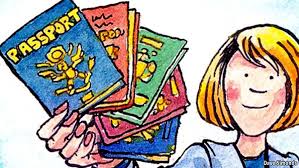Dual nationality has been fashionable for a relatively short time. Now, its time may be over
 Should dual nationality become a restricted right?
Should dual nationality become a restricted right?
For instance, you can have two (or more) passports but can vote only in one country. In the sense of franchise, you’re a citizen of only one nation.
Less than a hundred years ago, the League of Nations was proclaiming “every person should have a nationality and should have one nationality only”.
Till the 1990s, a European treaty required countries to limit dual citizenship.
The sanctity of citizenship, the allegiance you (must) feel to the country to which you belong (by law) is as much about psychology as it is about politics.
Do we, even in the age of globalization, need to reaffirm the sanctity of the bond between a citizen and their country?
Four years ago, The Netherlands proposed a law to limit dual nationality among immigrants as well as the Dutch diaspora. Now, the Dutch are pretty unambiguous about their views on dual nationality. They acknowledge: “The Dutch government wants to limit dual nationality as much as possible. If you have only one nationality, it will be clear what your rights are. That is why people who want to acquire Dutch nationality through naturalisation are, as a rule, required to give up their other nationality if possible. This is called the renunciation requirement.”
That said, the Dutch also recognize that some dual-nationals – Greek and Iranian – cannot ever give up their other nationality because they were born there. Moroccans too would find it hard. But those are exceptions, not the rule.
Why allow dual nationality (with full rights) at all? It depends on what one means by full rights. To naturalize as an American, one has to swear to “renounce and abjure all allegiance and fidelity to any foreign prince” though one can still have another passport and fully participate in the politics of another country (to the extent that the other country allows it). However, the US does require its nationals to pay it tax no matter where they live.
The Dutch may have been ahead of their times. In 2012, dual nationality was still considered a byproduct of globalization, mass migration, mass travel and inter-marriage across continents. According to a 2008 by the think-tank Migration Policy Institute, nearly half the world’s countries tolerated some form of dual nationality and others were coming round to it.
But not in unrestricted form.
India’s ‘Overseas Citizen’ card, which gives me a visa for life and the right to live and work in India, does not allow me to vote in Indian elections, run for office there or buy agricultural land.
German Turks, however, get to do all of that in both countries.
But there are signs that dual citizenship, especially that which is acquired, is increasingly coming under scrutiny. Germany and France regard naturalized dual-nationals as suitable to strip of citizenship if they’re involved in jihadi terrorism.
The age of multiple passports may be ending before it fully began.

